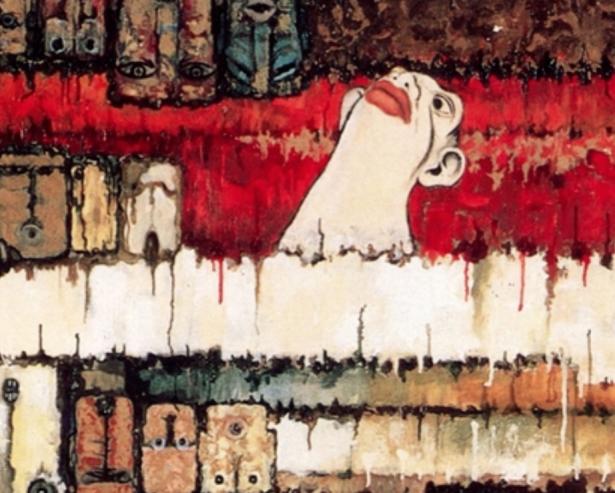What Can You Expect from a War Criminal?
WEDNESDAY, NOVEMBER 27, IS THE 65th ANNIVERSARY of massive demonstrations throughout Japan to protest the corrupt collaboration between the Japanese government and the U.S.
In Tokyo on this day in 1959, more than 70,000 protesters stormed and partially occupied the Japanese legislature to demand lawmakers reject a proposed U.S.-Japan Mutual Cooperation and Security Treaty. Similar demonstrations, with a total of tens of thousands of participants, occurred simultaneously throughout Japan.
The proposed treaty was hated by many Japanese because it contravened Japan’s post-World-War-2 constitutional commitment to be a militarily neutral nation like Switzerland, without any war-making apparatus. Neutralism was not only required by Japan’s constitution, but it had the support of most Japanese, who had suffered extraordinary hardships due to the fascist governments that had ruled the island nation for 13 years.
In addition, the proposed treaty had been negotiated by Japanese Prime Minister Kishi Nobusuke, who, as everyone in Japan knew, was a war criminal who had never been brought to justice, because the U.S. had never put him on trial for the crimes he had committed between 1935 and 1945. The U.S. Army had arrested Kishi in 1945, but quietly released him in 1948 without ever formally exonerating him or bringing him to trial. There was no doubt that Kishi, had he been tried, would have been convicted, and possibly executed, for his actions before and during World War 2, but U.S. occupation authorities preferred to allow him resume the right-wing political career he had begun in 1935. He became Japan’s Prime Minister in 1957.
The illustration is a caricature of Prime Minister and unprosecuted war criminal Kishi, painted by one of Japan’s forgotten left-wing “reportage” artists, Ishii Shigeo, in 1961. https://visualizingcultures.mit.edu/protest_art_50s_japan/anp1_essay.pdf
The Battle of Seattle’s Unexpected Outcome
SATURDAY, NOVEMBER 30, IS THE 25th ANNIVERSARY of the beginning of the 4-day Battle of Seattle, during which at least 40,000 militant protesters succeeded in paralyzing the 1999 Ministerial Conference of the World Trade Organization. The meeting of hundreds of government officials from all over the world was forced to adjourn without having accomplished anything except to demonstrate their vulnerability to popular antagonism to globalization.
The protesters who came to Seattle objected to the World Trade Organization’s hostility to democratic rule, workers’ rights, environmental protection, consumer protection and a host of related issues.
On the first day of the meeting, the protesters overwhelmed police efforts to keep the streets around the Washington State Convention and Trade Center open with the result that the meeting’s opening ceremony was officially cancelled. After that, the mayor of Seattle declared a state of emergency, imposed a curfew, and established a 50-block "no-protest zone" surrounding the convention center. The state’s governor deployed two battalions of the National Guard to help the Seattle police enforce the mayor’s proclamations.
Despite the show of force, which included the reckless and indiscriminate use of pepper spray and tear gas on nonviolent protesters, as well as more than 600 arrests, the protest achieved its goal of preventing the meeting from accomplishing anything.
In the aftermath of the protests, Seattle’s police chief was forced to resign and the city had to pay a total of $250,000 to settle claims of false arrest brought by more than 150 individuals. https://labornotes.org/blogs/2019/11/twenty-years-later-remembering-battle-seattle
We’re Not Raw Material, We’re Human Beings!
MONDAY, DECEMBER 2, IS THE 60th ANNIVERSARY of a great moment in the oratory of political protest, a 7-minute speech delivered by Mario Savio, one of the leaders of the Free Speech Movement, while standing on the steps of Sproul Hall on the Berkeley campus of the University of California in 1964.
I have no doubt that I find Savio’s words to be particularly affective because I was a high-school senior in San Francisco at the time and I had the opportunity to spend many hours in Berkeley showing my support for the right to freedom of speech of UC students. I wasn’t there when Savio spoke that day, but I had the good luck to hear, and be stirred by, his words on other occasions.
The most memorable nut of his December 2 speech in defense of U.C. teaching assistants’ right-to-strike is this: “There is a time when the operation of the machine becomes so odious, makes you so sick at heart, that you can't take part! You can't even passively take part! And you've got to put your bodies upon the gears and upon the wheels ... upon the levers, upon all the apparatus, and you've got to make it stop! And you've got to indicate to the people who run it, to the people who own it, that unless you're free, the machine will be prevented from working at all!” Follow this link if you’d like to hear (or read) the whole 7-minute presentation: https://www.americanrhetoric.com/speeches/mariosaviosproulhallsitin.htm
A Brave Doctor Helps to Lead the Way
TUESDAY, DECEMBER 3, IS THE 55th ANNIVERSARY of a local TV news report that came as a big surprise for almost anyone who was tuned to Seattle, Washington’s Channel 5 that evening in 1969.
The news was that a physician who was a general practitioner in nearby Renton had announced to the governor of Washington State and to the media that he had performed hundreds of abortions over the previous three years.
Somewhat surprisingly, Dr. Frans Koome was not arrested as a result of his confession. Prosecutors said they would not take any action against him unless they received a formal complaint, which never happened. Less than a year later, the state's voters approved Referendum 20, making Washington the first state to legalize abortion by an act of the people. https://www.historylink.org/File/1336
For more People's History, visit
https://www.facebook.com/jonathan.bennett.7771/


Spread the word